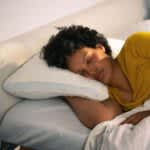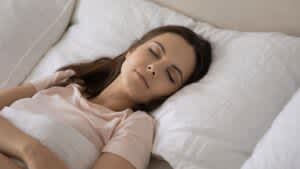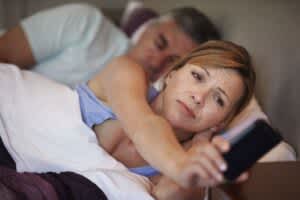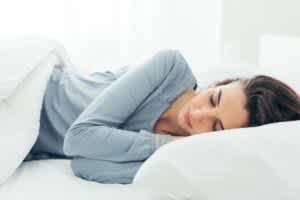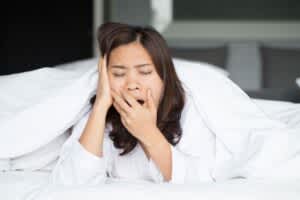Research suggests over half of working adults use the snooze button rather than waking up when their alarm first goes off in the morning. Many of us cannot help but hit snooze, even though we know it is not helping us get much more sleep.
We explore the reasons people hit snooze, the potential downside to snoozing, and actions you can take to help you wake up the first time your alarm sounds.
Why Do I Keep Hitting the Snooze Button?
The snooze button likely feels tempting because of sleep inertia. Sleep inertia is a groggy feeling you might feel at times immediately after waking up. During sleep inertia, you are still not fully alert, and you want to go back to sleep rather than get out of bed and begin your day.
Sleep inertia is a normal feeling we all experience as we transition from being asleep to being fully awake. People tend to experience more intense sleep inertia when they are sleep deprived. If you are part of the one-third of Americans sleeping less than seven hours per night, your tendency to hit snooze could be the result of not obtaining enough sleep. Trouble waking up is also more common in people with certain sleep disorders, mood disorders, and jobs that require them to wake up at unusual hours.
Is Hitting the Snooze Button Bad?
The snooze button is not necessarily bad. Maybe you just want a few extra minutes in bed, but you do not want to miss arriving at work on time.
Hitting snooze in the morning is not a substitute for obtaining adequate sleep, however. Also, because sleep inertia is amplified when you are woken up from certain stages of sleep, continuing to hit snooze may just extend its effects. Although sleep inertia usually goes away within 30 minutes, it can last for hours. Extended sleep inertia could interfere with your ability to focus at work or even your ability to get to work, increasing your risk of a drowsy driving accident.
Tips to Stop Hitting the Snooze Button
There are several methods you can try to break the habit of hitting the snooze button.
Go to Bed Earlier
Sometimes, resisting the temptation to hit snooze requires getting enough sleep. Adjust your sleep schedule, so you are able to sleep for at least seven hours. If you have been sleep deprived for a while, it might take several days to catch up on lost sleep, or pay off your sleep debt. When you no longer have sleep debt and wake up feeling refreshed, you are less likely to feel the need to hit snooze.
Practice Good Sleep Hygiene
Practicing good sleep hygiene can help you sleep more and enjoy better-quality sleep. Make your bedroom as dark, cool, and quiet as possible. It also helps to go to bed and wake up at the same time every day. To avoid sleep disruptions from blue light, it is best to turn off your electronic devices at least 30 minutes before bed. Following a bedtime routine with calming activities can help relax you into sleep.
Try Caffeine
Studies suggest that consuming caffeine can help you feel more alert after waking up. Consider getting a programmable coffee maker, and schedule it to start brewing a few minutes before your alarm goes off. The enticing aroma might lure you out of bed. Also, if you are taking a midday nap, having some caffeine before you lie down may reduce sleep inertia after you wake up.
Let in the Light
Light exposure suppresses melatonin, the sleep hormone. As a result, allowing light into your room when you have first woken up might help you feel more alert and awake. As soon as your alarm goes off, it may help to open the curtains or shades to let sunlight in. Or, if you have smart lights, you can schedule them to turn on when your alarm sounds.
You can also use light instead of sound to wake you up. Dawn simulators slowly brighten up your bedroom, helping you naturally wake up. Research shows that dawn stimulators reduce the sleepiness a person feels upon waking.
Listen to Music
Research shows that listening to upbeat music you enjoy can help you feel more alert after you have woken up. If you have a smart stereo system, consider using that as your alarm. You can program it to play energizing music you like at the time you would like to wake up, so you can start your day on a positive note.
You may also want to consider a musical alarm. Many people opt for a blaring, intense alarm sound to jolt themselves awake, but research suggests a pleasant melody may be more effective. People who choose melodic, harmonious sounds as their alarm clock say they feel less sleep inertia.
Use a Smart Alarm
A smart alarm clock is another option. These smartphone apps monitor your sleep and estimate which stage of sleep you are in. Then, they wake you up during a lighter stage of sleep when you are less likely to feel the effects of sleep inertia. Research suggests they do not always accurately identify your sleep stage, however.
Place Your Alarm Out of Reach
The farther away your alarm is from your bed, the better. The physical act of getting up to turn your alarm off can help you stay up, if you can resist the urge to climb back into bed afterward.
Stay Motivated
Whether you want to become a morning person or you have goals of exercising before work, there are plenty of reasons to stop hitting snooze. Keeping a note on your nightstand with your reason for waking up early can help you stay motivated.
Visit Your Doctor
For many people, hitting snooze is the result of not obtaining enough sleep the night before. Some people experience more severe sleep inertia and hit the snooze button due to underlying health issues, however. Intense sleep inertia is called sleep drunkenness, and it occurs more commonly in people with certain sleep disorders and mood disorders. If you are sleeping the recommended seven to nine hours per night and still struggling to wake up, a doctor can help you determine the cause and proper treatment.
References
Ask the Sleep Doctor
Have questions about sleep? Submit them here! We use your questions to help us decide topics for articles, videos, and newsletters. We try to answer as many questions as possible. You can also send us an email. Please note, we cannot provide specific medical advice, and always recommend you contact your doctor for any medical matters.












